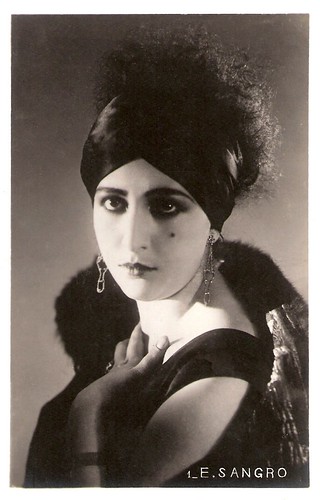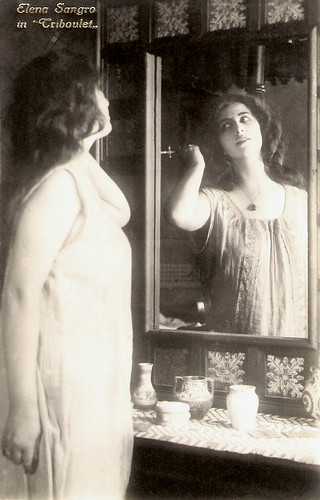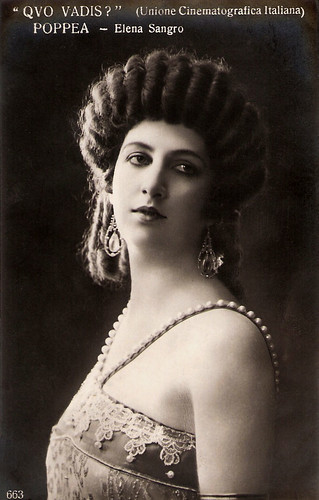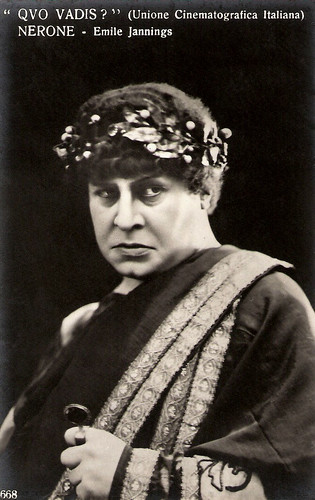Elena Sangro (1896-1969) was one of the main actresses of the Italian cinema of the 1920s. In spite of the general film crisis then, she made one film after another. She was also one of the first female directors and she had a famous affair with the 64-year-old poet Gabriele D'Annunzio.

Vintage Italian postcard.
Baron Kanzler
Elena Sangro was born Maria Antonietta Bartoli Avveduti in Vasto d'Aimone, Italy, in 1896 (although Wikipedia and IMDb claim that she was born in 1901). After attending acting lessons at the Accademia di Santa Cecilia, she debuted on stage in La cena delle beffe (The Jesters' Supper) by Sem Benelli and in Patria (Homeland) by Victorien Sardou. Baron Kanzler introduced her to director Enrico Guazzoni who gave the young actress the lead of his film Fabiola (1918). After the success of this film, more roles followed such as in the epic La Gerusalemme liberata/Jerusalem Liberated (1918, Enrico Guazzoni) based on the poem by Torquato Tasso, and the comedy Primerose (1919, Mario Caserini). In a series of films, she had her cousin Giorgi Fini as her partner: Il più forte amore/The strongest love (1920), Il fauno di marmo/The Marble Faun (1921, Mario Bonnard) and L'eredità di Caino/The Legacy of Cain (1921, Giuseppe Maria Viti). In L'onesto mondo/The honest world (1921, Torello Rolli), she played a singer who sacrifices herself for an unworthy man. She appeared as a proud and patriotic princess opposite Rina De Liguoro in Saracinesca/Portcullis (1922, Augusto Camerini, Gaston Ravel), set in papal Rome. That same year she also played in the pro-Montenegro drama Non c'è resurrezione senza morte/There Is No Resurrection Without Death (1922, Edoardo Bencivenga) based on the memories of Vladimir Popovic and personally produced by Sangro. A pro-Montenegro, headed by her friend, poet Gabriele D'Annunzio, promoted the film. A few years ago the film was found, restored, and presented at the Giornate del Cinema Muto, the silent film festival in the Italian city of Pordenone.

Rina de Liguoro, co-star of Elena Sangro in several films. German postcard by Ross Verlag. no. 3902/1, 1928-1929. Photo: Pinto Roma.

Italian postcard. Photo: publicity still from Triboulet (1921).
Hell Like A Sort Of brothel
Elena Sangro starred in the historical serial Triboulet (1924, Febo Mari), as Poppea in Quo Vadis? (1924, Georg Jacoby, Gabriellino D'Annunzio - the son of) starring Emil Jannings and in the fantastic peplum comedy Maciste all'inferno/Maciste in Hell (1925, Guido Brignone). The latter was one of three Maciste films in which she appeared opposite strongman Bartolomeo Pagano. When the film was first released it was censored because it presented Hell like a sort of brothel in which hordes of semi-naked women lived. Privately, Sangro had a famous affair with the old poet Gabriele D'Annunzio. He dedicated to her the erotic poem Alla Piacente/To the pleasant one. In the cinema she was the seductress in Addio giovinezza/Farewell to youthful romances (1927, Augusto Genina) with Walter Slezak and Carmen Boni, and played in Germany in Villa Falconieri (1928, Richard Oswald) with Maria Jacobini and Hans Stüwe. She finished her silent film career as the spicy Madonna Orietta in the heavily censored Boccaccesca (1928, Alfredo de Antoni).

Italian postcard by Ed. A. Traldi, Milano, no. 663. Photo: Elena Sangro as the Empress Poppea in the epic film Quo vadis? (Gabriellino D'Annunzio/ Georg Jacoby 1924/1925), a production of UCI (Unione Cinematografica Italiana).

Emil Jannings in Quo Vadis? (1924). Italian postcard by editor A. Traldi, Milano.
Restless Woman
In the sound era, Elena Sangro returned to the stage where she sang under the pseudonym of Lilia Flores. She had a small role in Il re Burlone/The King's Jester (1935, Enrico Guazzoni). In the early 1940's she made various art documentaries with Anton Bià. She also appeared in bit roles in films like L'abito nero da sposa/The Black Dress of the Bride (1945, Luigi Zampa) starring Fosco Giachetti, and the biography Enrico Caruso: leggenda di una voce/The Young Caruso (1951, Giacomo Gentilomo) with Gina Lollobrigida. The last job of this restless woman was president of Associazione dei Pionieri del Cinema, an initiative begun in the early 1960's in order to saveguard this important part of film history. Her last film appearance was a cameo in Federico Fellini's masterpiece 8½ (1963). Elena Sangro died in 1969 in Roma (Rome, Italy), at the age of 72.
Source: Vittorio Martinelli, Le dive del silenzio (Italian), Lino Spadaccini (Noi Vastesi) (Italian), Anna Battista (Irenebrination), Wikipedia (Italian) and IMDb.

Vintage Italian postcard.
Baron Kanzler
Elena Sangro was born Maria Antonietta Bartoli Avveduti in Vasto d'Aimone, Italy, in 1896 (although Wikipedia and IMDb claim that she was born in 1901). After attending acting lessons at the Accademia di Santa Cecilia, she debuted on stage in La cena delle beffe (The Jesters' Supper) by Sem Benelli and in Patria (Homeland) by Victorien Sardou. Baron Kanzler introduced her to director Enrico Guazzoni who gave the young actress the lead of his film Fabiola (1918). After the success of this film, more roles followed such as in the epic La Gerusalemme liberata/Jerusalem Liberated (1918, Enrico Guazzoni) based on the poem by Torquato Tasso, and the comedy Primerose (1919, Mario Caserini). In a series of films, she had her cousin Giorgi Fini as her partner: Il più forte amore/The strongest love (1920), Il fauno di marmo/The Marble Faun (1921, Mario Bonnard) and L'eredità di Caino/The Legacy of Cain (1921, Giuseppe Maria Viti). In L'onesto mondo/The honest world (1921, Torello Rolli), she played a singer who sacrifices herself for an unworthy man. She appeared as a proud and patriotic princess opposite Rina De Liguoro in Saracinesca/Portcullis (1922, Augusto Camerini, Gaston Ravel), set in papal Rome. That same year she also played in the pro-Montenegro drama Non c'è resurrezione senza morte/There Is No Resurrection Without Death (1922, Edoardo Bencivenga) based on the memories of Vladimir Popovic and personally produced by Sangro. A pro-Montenegro, headed by her friend, poet Gabriele D'Annunzio, promoted the film. A few years ago the film was found, restored, and presented at the Giornate del Cinema Muto, the silent film festival in the Italian city of Pordenone.

Rina de Liguoro, co-star of Elena Sangro in several films. German postcard by Ross Verlag. no. 3902/1, 1928-1929. Photo: Pinto Roma.

Italian postcard. Photo: publicity still from Triboulet (1921).
Hell Like A Sort Of brothel
Elena Sangro starred in the historical serial Triboulet (1924, Febo Mari), as Poppea in Quo Vadis? (1924, Georg Jacoby, Gabriellino D'Annunzio - the son of) starring Emil Jannings and in the fantastic peplum comedy Maciste all'inferno/Maciste in Hell (1925, Guido Brignone). The latter was one of three Maciste films in which she appeared opposite strongman Bartolomeo Pagano. When the film was first released it was censored because it presented Hell like a sort of brothel in which hordes of semi-naked women lived. Privately, Sangro had a famous affair with the old poet Gabriele D'Annunzio. He dedicated to her the erotic poem Alla Piacente/To the pleasant one. In the cinema she was the seductress in Addio giovinezza/Farewell to youthful romances (1927, Augusto Genina) with Walter Slezak and Carmen Boni, and played in Germany in Villa Falconieri (1928, Richard Oswald) with Maria Jacobini and Hans Stüwe. She finished her silent film career as the spicy Madonna Orietta in the heavily censored Boccaccesca (1928, Alfredo de Antoni).

Italian postcard by Ed. A. Traldi, Milano, no. 663. Photo: Elena Sangro as the Empress Poppea in the epic film Quo vadis? (Gabriellino D'Annunzio/ Georg Jacoby 1924/1925), a production of UCI (Unione Cinematografica Italiana).

Emil Jannings in Quo Vadis? (1924). Italian postcard by editor A. Traldi, Milano.
Restless Woman
In the sound era, Elena Sangro returned to the stage where she sang under the pseudonym of Lilia Flores. She had a small role in Il re Burlone/The King's Jester (1935, Enrico Guazzoni). In the early 1940's she made various art documentaries with Anton Bià. She also appeared in bit roles in films like L'abito nero da sposa/The Black Dress of the Bride (1945, Luigi Zampa) starring Fosco Giachetti, and the biography Enrico Caruso: leggenda di una voce/The Young Caruso (1951, Giacomo Gentilomo) with Gina Lollobrigida. The last job of this restless woman was president of Associazione dei Pionieri del Cinema, an initiative begun in the early 1960's in order to saveguard this important part of film history. Her last film appearance was a cameo in Federico Fellini's masterpiece 8½ (1963). Elena Sangro died in 1969 in Roma (Rome, Italy), at the age of 72.
Source: Vittorio Martinelli, Le dive del silenzio (Italian), Lino Spadaccini (Noi Vastesi) (Italian), Anna Battista (Irenebrination), Wikipedia (Italian) and IMDb.
2 comments:
Emil Jannings in Quo Vadis? (1924). Italian postcard by editor A. Traldi, Milano. = missing....
Trouwens: wat een prachtige blog zeg. Dank!
Emil = Back.
Thanks!
Post a Comment